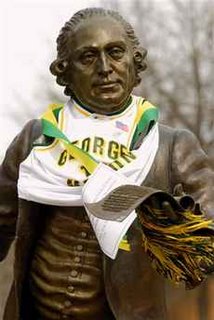 Here’s a roundup of more press attention GMU’s basketball team has been generating for our econ department.
Here’s a roundup of more press attention GMU’s basketball team has been generating for our econ department.Fox News writes:
The Washington Post reports:
George Mason University today in many ways remains a fitting tribute to its namesake. The school's economics department in particular is arguably the most market-oriented in the country. Just as Mason himself was self-educated and unswervingly principled, GMU's economics department has put a premium on finding staff who value individual rights, a decentralized state, and good scholarship, and has placed less emphasis on Ivy League credentials and the usual academic fluff.
The staff now boasts two Nobel Prize winners (as well a strong candidate for a third), and has established itself as the seat of free market academic economics, the torchbearer of Founding Father influences like Adam Smith and John Locke. George Mason is also affiliated with the Mercatus Center and the Institute for Humane Studies, non-profit academic and educational organizations, respectively, which are dedicated to the same ideas.
And from the Philadelphia Inquirer:
Back before George Mason University's basketball team was two wins away from a national championship, the school had a different set of all-stars: its economics department. It counts two Nobel laureates and is a ground-breaker in research into how changing incentives affect people's behavior.
But perhaps the two sets of stars have something to learn from each other. Basketball, as it turns out, makes an intriguing laboratory for testing economic theories against how things work in the real world -- a specialty of George Mason's economists.
Economists have game theory; the basketball players have just got game.
They go on to draw an analogy between basketball and public choice (one of GMU’s economic specialties):
George Mason's economics department was put on the map by its other Nobel winner, James Buchanan, who broke ground in using economic tools to analyze political decision making and the impact of laws on society. It's called public choice theory, and its lessons are particularly useful for the basketball court.
Think of a basketball game as a vastly simplified proxy for the real world. There are laws that govern behavior (the rulebook), people who enforce those laws (referees), and a way to measure who is succeeding and who isn't (the score).
Just as lawmakers can change the way wealth is distributed by changing tax and other rules, changes to the rules of basketball can have sometimes unpredictable effects on what teams score the most, and how.
Read my previous roundup here.
I'm apparently one of the few people around here who had actually heard of George Mason University before this week.
No, I didn't spot the Northern Virginia school as the Cinderella story of this year's NCAA basketball championships. To be totally truthful, a month ago I couldn't have told you with complete confidence that George Mason even had a basketball team, much less one capable of upsetting powerhouses such as Michigan State, North Carolina and Connecticut.
The George Mason team I'm familiar with isn't part of the athletic program at all. It's rather in the school's economics department.
George Mason stands out, for two reasons. One: It's young. Started in 1957, it was merely the University of Virginia's continuing-education branch until 1972, when it got a name and a charter from that state's legislature.
And two: Its economists have a habit of jumping their discipline's traditional tracks.
This traces back to James Buchanan, now an emeritus professor at George Mason, who pioneered a branch of economics called "public choice."
It's based on the idea that mayors, governors and congressmen don't actually turn into public-spirited angels when they get elected. Rather, like everyone else in the economic universe, public servants are motivated mainly by self-interest.
That's not all they do at George Mason, moreover. A professor there named Tyler Cowen has taken public choice a step or two further, applying economic ideas to art and culture.
He's challenged the notion that "high" art is (or should be) somehow separate or above the market, and studied the economics behind both pop stars and starving artists.
Another George Mason professor, Laurence Iannaccone, leads a mini-movement of economists who study religion. Just to give you an idea, Iannaccone's latest paper, posted on his economicsofreligion.com Web site, is titled "The Market for Martyrs - An economic-sociological perspective on religion and suicide bombing."
A lot of their work is technical and can be tough for average folks to wade through. But some George Mason economists also work at reaching a wider audience. Several maintain active Internet blogs, where they specialize in taking provocative positions on hot current issues.
One is called Econlog. Another is named Marginal Revolution. A third (named for the father of modern libertarianism) is Café Hayek.
Check 'em out; agree or not, you'll find plenty there to chew on while you're watching George Mason try to go all the way at the NCAA's big dance.
Go Patriots!
Go Patriots!!!
1 comment:
That would indded be strange... Like a world with upward sloping demand curves!
Post a Comment